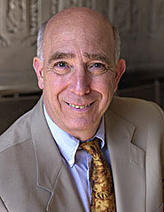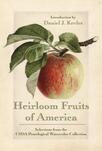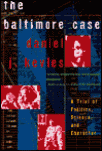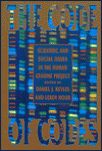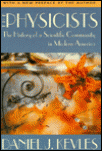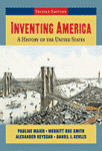Daniel Kevles
HSHM: US since 1939; Politics, government, science, technology & national security; Eugenics; Genetics; Biotechnology; Intellectual property; Plant & animal breeding
Professor Kevles received his B.A. from Princeton University (Physics) in 1960, training at Oxford University (European History) from 1960-61, and his Ph.D. from Princeton (History) in 1964. His research and writings encompass the interplay of science, technology, and society past and present with a focus on the United States. His particular research interests include the history of physics, biology, scientific fraud and misconduct, plant and animal breeding, biotechnology, intellectual property, and science, arms, and the state.
His teaching areas are the history of modern science and technology, including genetics, physics, science and technology in America, innovation and intellectual property in living organisms, science and national security, and the United States in the 1970s.
Selected Publications
-
Heirloom Fruits of America: Selections from the USDA Pomological Watercolor Collection (Berkeley, CA: Heyday Press, 2020), editor and author of the “Introduction”
-
Living Properties: Making Knowledge and Controlling Ownership in the History of Biology, coeditor with Jean-Paul Gaudilliere and Hans-Joerg Rheinberger (Preprint No. 382; Berlin: Max Planck Institute for History of Science, 2009)
- Inventing America: A History of the United States, coauthored with Alex Keyssar, Pauline Maier, and Merritt Roe Smith (New York: W.W. Norton, 2002; 2nd edition 2006)
- The Baltimore Case: A Trial of Politics, Science, and Character; (New York: W. W. Norton, 1998)
- Le Scienze Biologiche e la Medicina, coedited with Gilberto Corbellini, in Storia della Scienza, Vol. VIII, director, Sandro Petruccioli (Rome: Istituto delia Enciclopedia Italiana, 2004) pp. 659-953
- The Code of Codes: Scientific and Social Issues in the Human Genome Project, edited with Leroy Hood Harvard University Press, 1992; (paperback, 1993); published in Germany (Artemis and Winkler), 1994 and in Japan (Ague Shotu-Sha), 1997.
- In the Name of Eugenics: Genetics and the Uses of Human Heredity Alfred A. Knopf, 1985; University of California Press,1986 (paperback); Harvard University Press, 1995 (paperback with new preface). Also published in England (Penguin), Japan (Asahi), Spain (Editions Planeta), France (Presse Universitaire de France).
- The Physicists: The History of a Scientific Community in Modern America Alfred A. Knopf, 1978. Vintage, 1979 (paperback); Harvard University Press, 1987,1995. Also published in France (Paris: Anthropos,1988).
-
“The Scandal of the U.S. Drug Supply,” New York Review of Books, July 23, 2020;
- “Enlisting the Laboratories: World War II and the High-Technology West,” in David M. Kennedy and Mark Brilliant, World War II and the West It Wrought (Stanford, CA: Stanford U. Press, 2020), pp. [tk];
- “Not Just Rocket Science,” review of Fraser MacDonald, Escape from Earth: A Secret History of the Space Rocket, Times Literary Supplement, Oct. 11, 2019, pp. 30-31;
- “Why Is Medicine So Expensive?” New York Review of Books, Feb. 21, 2019;
- “Struggles for Truth: Scientists, Hucksters, and Charlatans in Nineteenth-Century America,” Social Research: 85(No. 4, Winter, 2018, pp. 863-887;
- “Practical Pressures and Scientific Payoffs: A Long View of Knowledge and Utility in Federal Research,” Social Research, 84(Fall 2017), 561-582;
- “Teaching Trump, The Huffington Post, Nov. 11, 2016, @ http://www.huffingtonpost.com/entry/58254fdae4b0852d9ec213ee?timestamp=1478841028989;
- “What’s Manifest in the History of Science: Reflections on The History Manifesto,” Isis, 107(June 2016), 315-323;
- “If You Could Design Your Baby’s Genes, Would You?” Politico, Dec. 9, 2015, online: also, in a different version, in Issues in Science and Technology (National Academy of Sciences), Spring 2016, pp. 43-59;
- “What’s Manifest in the History of Science: Reflections on The History Manifesto,” Isis, 107(June 2016), 315-323;
- “If You Could Design Your Baby’s Genes, Would You?” Politico, Dec. 9, 2015, online: also, in a different version, in Issues in Science and Technology (National Academy of Sciences), Spring 2016, pp. 43-59;
- “Inventing the World: 1845,” Scientific American, Dec. 2015, pp. 40-52;
- “Spy Among the Atoms,” Times Literary Supplement, Oct. 23, 2015, pp.5, 7.
- “Medicare, Medicaid, and Pharmaceuticals: The Price of Innovation,” in Yale Journal of Health Policy, Law, and Ethics: Symposium Issue: The Law of Medicare and Medicaid at 50, XV(Winter 2015), 241-46
- “Reflections on the History of Eugenics: Past, Present, and Future,” HSNS: Historical Studies in the Natural Sciences, 44(Dec. 2014), 521-530;
- “The Nobel Prize in Chemistry: Life in Sharp Focus,” The New Yorker.com, Oct. 10, 2014;
- “Inventions, Yes; Nature, No: The Birth of the Products-of-Nature Doctrine from the American Colonies to the U.S. Courts,” Perspectives on Science, 23(Oct. 2014), 1-22;
- “Cross Era’s Dark Secret Resurfaces: A Cautionary Comment,” New Haven Independent, Sept. 24, 2014, @ http://www.newhavenindependent.org/index.php/archives/entry/cross_eras_dark_secret_resurfaces/;
- “Eugenics: Historical Aspects,” Encyclopedia of Bioethics, Ed. Bruce Jennings (4th ed.; Farmington Hills, MI: Macmillan Reference USA, 2014), Vol. 2, 1080-1086;
- “Why and How [We Write the History of Science]: Reflections in an Autobiographical Key,” Science in Context, 26(Dec. 2013), 627-638;
- “A Primer of A, B, Seeds: Advertising, Branding, and Intellectual Property in an Emergent Industry,” UC Davis Law Review, 47(Dec. 2013), 657-678;
- “The Genes You Can’t Patent,” New York Review of Books, Sept. 26, 2013, pp. 83-84;
- “Oppenheimer’s Patriotic Duty,” a review of Ray Monk’s biography of J. Robert Oppenheimer, Times Literary Supplement, April 19, 2013;
- “Can They Patent Your Genes?” New York Review of Books, March 7, 2013, pp. 24-29;
- Not “A Hundred Millionaires”: Federal Science in the Civil War and the Gilded Age,” Issues in Science and Technology, Winter 2013; also available at: http://www.issues.org/29.2/Daniel.html;
- “Genes, Railroads, and Regulation: Intellectual Property and the Public Interest,” in Mario Biagioli and Jessica Riskin, eds., Nature Engaged: Science in Practice from the Renaissance to the Present (New York: Palgrave MacMillan, 2012), pp. 147-162;
- “The Ten Best American Presidents,” Newsweek: Special Commemorative Issue, Oct. 2012, pp. 26-28; Oct. 2012, pp. 26-28;
- “Bridges to Somewhere: It’s Time America Makes Good Again on Its Belief in Public Works and Public Spirit,” The Daily Beast, Sept. 1, 2012; available at: http://www.thedailybeast.com/articles/2012/09/01/it-s-time-america-makes…
- “Cultivating Art and Property in American Fruits,” Smithsonian Magazine, 42 (July/August 2011), 76-82;
- “From Eugenics to Patents: Genetics, Law, and Human Rights,” Annals of Human Genetics, forthcoming, late summer, 2010
- “An American Passion Revealed,” [essay review of Philip Pauly’s Fruits and Plain], The New York Review of Books, May 13, 2010, pp. 53-55
- “New Blood, New Fruits: Protections for Breeders and Originators, 17898-1930,” in Mario Biagioli, Peter Jaszi, and Martha Woodmansee, eds., Emergent IP: Rethinking Authorship and Inventorship (University of Chicago Press, forthcoming, 2010)
- “Genes, Railroads, and Regulation: Intellectual Property and the Public Interest,” in Mario Biagioli and Jessica Riskin, eds., Worldly Science: Instruments, Practices, and the Law (forthcoming: New York: Palgrave MacMillan, 2010)
- “Heredity Produced,” Historical Studies in the Natural Sciences, 39 (No. 4, 2009), 482-490 [an essay review]
- “Eugenics, the Genome, and Human Rights,” Medicine Studies, I(No. 2, 2009), 85-93 (an expanded version of the article with the same title below)
- “Martyred by Monsters,” [essay review of Peter Pringle, The Murder of Nikolai Vavilov: The Story of Stalin’s Persecution of One of the Great Scientists of the Twentieth Century (2008)], The New York Review of Books, October 9, 2008, pp. 21-23; reprinted as “Nikolai Vavilov, martry russe de la genetique,” La Recherche, mars 2009, pp. 56-60
- Eugenics, the Genome, and Human Rights, in Michael Yudell and Rob DeSalle, eds., The Genomic Revolution: Unveling the Unity of Life (Washington, D.C.: Jospeh Henry Press, with the American Museum of Natural History, 2002), 147-154
- “The Contested Earth: Science, Equity, and the Environment,” Daedalus, (spring 2008), pp. 80-95
- “Fruit Nationalism: Horticulture in the United States from the Revolution to the First Centennial,” in Aurora Torealis: Studies in the History of Science and Ideas in Honor of Tore Frangsmyr, eds. M. Beretta, K. Grandin & S. Lindqvist (Sagamore Beach, MA: Science History Publications/USA, 2008), pp. 129-146
- “Foreword,” to Nathaniel Comfort, Ed., The Panda’s Black Box: The Intelligent Design Controversy (Johns Hopkins U. Press, 2007), pp. ix-xv
- “The Poor Man’s Atomic Bomb,” New York Review of Books, April 12, 2007, pp. 60-63
- “Howard Temin: Rebel of Evidence and Reason,” in Oren Harman and Michael Dietrich, eds., Rebels, Mavericks, and Heretics in Biology (Yale U. Press, 2008) pp. 248-264
- “Protections, Privileges, and Patents: Intellectual Property in American Horticulture,” Proceedings of the American Philosophical Society, 152 (June 2008), 207-13
- “Patents, Protections, and Privileges: Intellectual Property Protection in Animals and Plants,” Isis, June 2007, pp. 323-331
- “Genes, Disease, and Patents: Cash and Community in Biomedicine,” in Caroline Hannaway, ed., Biomedicine in the Twentieth Century: Practices, Policies, and Politics (Amsterdam: IOS Press, 2008), pp. 203-216
- “Max Delbruck,” Dictionary of Scientific Biography (forthcoming, 2008)
- “What’s New About the Politics of Science?” Social Research, 73(Fall 2006)
- “The Blame Game,” The New Republic, Oct. 17, 2005, pp. 35-41 [essay review of Kai Bird and Martin Sherwin, American Prometheus: A Biography of J. Robert Oppenheimer]
- “Dr. Atomic: An opera about the moral complexities of Hiroshima,” Slate, Oct. 19, 2005 [essay review of John Adams and Peter Sellars’ opera about J. Robert Oppenheimer]
- “Scientists, Arms, and the State: J. Robert Oppenheimer and the Twentieth Century,” Berkeley Papers in the History of Science (Berkeley, CA: Office for the History of Science and Technology, 2005)
- “The Gene Wars,” The New Republic, May 2&9, 2005, pp. 33-37 [essay review of Oren Harman, The Man Who Invented the Chromosome]
- “Albert Einstein: Relativity, War, and Fame,” in A Century of Books: Princeton University Press, 1905-2005 (Princeton Univ. Press, 2005), pp. 115-24: a different version published as “Einstein’s Devils,” Times Literary Supplement, May 13, 2005, pp. 3-4
- “L’Affaire Baltimore: Politique, Justice, et Accusation de Fraude Scientifique,” in Distionnaire de la Pensee Medicale, sous la direction de Dominique Lecourt (Paris: PUF, 2004), 12-17
- International Eugenics, in Deadly Medicine: Creating the Master Race (Washington, D.C.: U.S. Holocaust Museum, 2004), pp. 41-60
